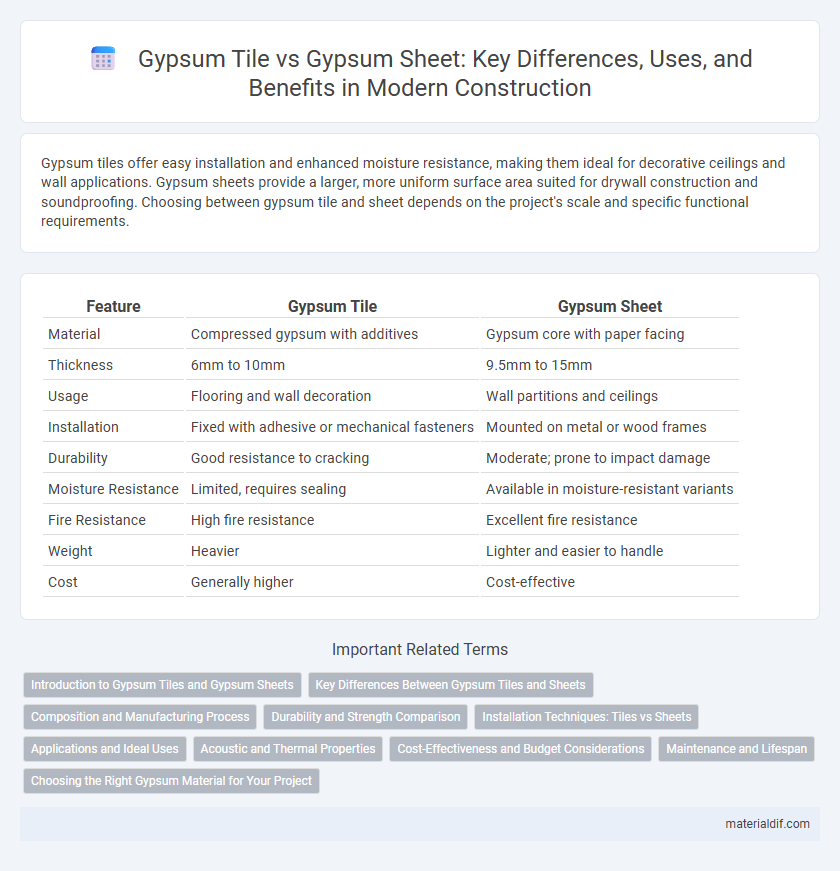Gypsum tiles offer easy installation and enhanced moisture resistance, making them ideal for decorative ceilings and wall applications. Gypsum sheets provide a larger, more uniform surface area suited for drywall construction and soundproofing. Choosing between gypsum tile and sheet depends on the project's scale and specific functional requirements.
Table of Comparison
| Feature | Gypsum Tile | Gypsum Sheet |
|---|---|---|
| Material | Compressed gypsum with additives | Gypsum core with paper facing |
| Thickness | 6mm to 10mm | 9.5mm to 15mm |
| Usage | Flooring and wall decoration | Wall partitions and ceilings |
| Installation | Fixed with adhesive or mechanical fasteners | Mounted on metal or wood frames |
| Durability | Good resistance to cracking | Moderate; prone to impact damage |
| Moisture Resistance | Limited, requires sealing | Available in moisture-resistant variants |
| Fire Resistance | High fire resistance | Excellent fire resistance |
| Weight | Heavier | Lighter and easier to handle |
| Cost | Generally higher | Cost-effective |
Introduction to Gypsum Tiles and Gypsum Sheets
Gypsum tiles are pre-cut, decorative panels made from natural gypsum mineral, designed for easy ceiling and wall installations with enhanced aesthetic appeal and moisture resistance. Gypsum sheets, also known as drywall or plasterboard, consist of large, flat boards made from a gypsum core sandwiched between paper liners, primarily used for wall partitions and ceilings in construction. Both gypsum tiles and sheets leverage the fire-resistant and sound-insulating properties of gypsum, but tiles offer greater design flexibility while sheets provide structural coverage efficiency.
Key Differences Between Gypsum Tiles and Sheets
Gypsum tiles are pre-finished, smaller units typically used for decorative ceiling patterns and provide quick installation, whereas gypsum sheets come in larger panels ideal for wall and ceiling surfaces requiring smooth, continuous coverage. Tiles offer better moisture resistance and sound absorption suited for specific applications, while sheets provide structural strength and are easier to cut for customized fitting. The choice between gypsum tiles and sheets depends on project requirements such as design complexity, installation speed, and functional performance.
Composition and Manufacturing Process
Gypsum tiles are produced by pressing a mixture of gypsum powder, water, and additives into dense, rigid panels, followed by drying and curing, resulting in a compact, moisture-resistant product ideal for flooring and wall applications. Gypsum sheets, on the other hand, consist of a solid gypsum core sandwiched between two thick layers of special paper or fiberglass mats, manufactured through a continuous process of pouring, shaping, drying, and finishing to create lightweight, easy-to-install drywall panels. The primary difference lies in gypsum tile's compressed, solid form versus gypsum sheet's layered, paper-encased construction, influencing their respective strength, flexibility, and moisture properties.
Durability and Strength Comparison
Gypsum tiles generally offer higher durability and strength compared to gypsum sheets due to their compact structure and added reinforcing materials. Gypsum sheets are lighter and more flexible but tend to be less resistant to impact and moisture, which can compromise their long-term performance. For applications requiring robust, load-bearing surfaces, gypsum tiles provide superior structural integrity and greater resistance to cracking and wear.
Installation Techniques: Tiles vs Sheets
Gypsum tiles require precise alignment and adhesive application for each individual piece, often necessitating skilled labor for intricate patterns or smaller areas. Gypsum sheets are installed by fastening large panels directly onto wall or ceiling frameworks, enabling quicker coverage and easier handling in expansive projects. Both installation methods demand careful joint treatment to prevent cracks and ensure a smooth, durable finish.
Applications and Ideal Uses
Gypsum tiles offer excellent sound insulation and fire resistance, making them ideal for ceiling applications in commercial spaces and residential buildings where both aesthetics and safety are priorities. Gypsum sheets provide a smooth, seamless surface, widely used for wall partitions, drywall, and ceilings in interior construction due to their ease of installation and versatility. Both products are moisture-resistant variants suited for bathrooms and kitchens, with gypsum sheets favored in larger-scale drywall systems, while gypsum tiles are preferred for decorative ceiling designs.
Acoustic and Thermal Properties
Gypsum tiles offer enhanced acoustic insulation due to their density and structure, effectively reducing sound transmission in interior spaces. Gypsum sheets, while providing decent thermal resistance, are typically more lightweight and easier to install but may not match the acoustic performance of gypsum tiles. Both materials contribute to fire resistance and humidity control, but gypsum tiles are preferred in environments demanding superior soundproofing and thermal insulation.
Cost-Effectiveness and Budget Considerations
Gypsum tiles generally offer a more cost-effective solution for smaller or decorative projects due to lower material and installation expenses compared to gypsum sheets. Gypsum sheets provide greater durability and coverage efficiency for larger-scale construction, often justifying higher upfront costs with long-term savings through reduced maintenance. Budget considerations should weigh initial investment against project scope, durability needs, and installation complexity when choosing between gypsum tile and gypsum sheet products.
Maintenance and Lifespan
Gypsum tiles require regular cleaning and occasional sealing to maintain their appearance, but they may be more prone to chipping and damage than gypsum sheets. Gypsum sheets offer longer lifespan due to their durability and resistance to moisture, making them ideal for wall and ceiling installations with minimal maintenance needs. Both materials benefit from proper installation and environment control to maximize durability and reduce repair frequency.
Choosing the Right Gypsum Material for Your Project
Gypsum tiles offer high durability and moisture resistance, making them ideal for flooring and wall cladding in wet areas. Gypsum sheets provide excellent fire resistance and acoustic insulation for ceilings and partition walls, ensuring structural safety and comfort. Selecting between gypsum tiles and sheets depends on project requirements such as load-bearing capacity, environmental exposure, and design flexibility.
Gypsum tile vs Gypsum sheet Infographic

 materialdif.com
materialdif.com